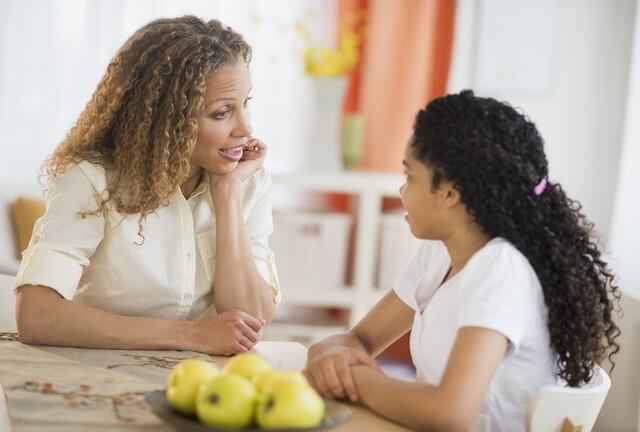
Divorced parent communication with your child is essential.
By Rosalind Sedacca, CDC
When you’re a divorced parent, effective communication with your children is more important than ever. Which means honing your communication skills so you’re connecting with love, respect and compassion.
Candid divorced parent communication opens the doors to a healthier, more positive relationship with your kids. It makes you more sensitive to issues of concern early on so you can nip them in the bud. It encourages your children to talk about what they are feeling. It addresses their questions and situations that are creating conflict for them.
How to open the conversation so you’re not shut down!
Don’t sit down and say, let’s talk. Find comfortable times and places where conversation can flow naturally and easily. Then bring up related subjects in a casual way. Watching TV or movies at home can often be a catalyst for meaningful interaction. Driving in the car together can also be a time of discussion, questions and sharing feelings.
Here are 6 valuable tips that can help you ease into more productive divorced parent communication with your kids.
1) Ask “What Happened?”
Asking why questions can be intimidating and close off your conversation. Instead ask what happened questions which keep the dialogue open. Then move into talking about feelings which provide insights into what’s really going on with your child. Validate their right to their feelings, even if you’re uncomfortable hearing about them. When they feel safe in expressing their emotions, you’ll get real clues as to how your divorce is affecting them – and whether there are changes taking place worthy of your special attention.
2) Be patient. Don’t react or respond until you get the full message. Sometimes it takes some meandering for your child to reach the crucial point of what they want to say. Don’t coax, dismiss – or shut them off too soon!
3) Listen Attentively. Remember that preaching, moralizing or “parenting” comments can put up barriers to clear communication. Listening is your most valuable skill and tool. Then paraphrase back what you’re hearing to make sure you are getting it right. “So, you were annoyed at dad for forgetting to call you last night,” is far different from saying, “I don’t blame you for being angry at dad. He’s so undependable.” When you editorialize or take sides, you’re likely to lose your connection. Listen closely and ask your child to help find choices and solutions that can ease the pain.
4) Show your respect. Watch your judgments and put-downs, even with upsetting information. Don’t belittle your children, call them names or insult their behaviors. Talk to them – not at them! The difference is felt as respect. Be careful never to put down or disrespect your child’s other parent in your conversations, as tempting as that may be at times. Keep your kids out of the divorce drama as much as possible. That’s when real emotional damage is done.
5) Acknowledge your children. Praise how brave they are for coming to you or sharing issues with you. If you were at fault, apologize honestly and discuss how you can make changes for the future. Remind them how much they matter to you. Sometimes post-divorce parent-child communication can be a very slow process as you rebuild trust and a sense of security within them.
6) Be accepting. Tell your kids that you accept and love them – even when their behaviors are not acceptable. Then help them come up with some acceptable solutions they can understand, relate to and feel good about. Support and positive role modeling go a long way toward influencing your children in the right direction.
Put yourself in your child’s place and you will likely make wiser decisions when it comes to talking about sensitive issues in their life. Still afraid to talk about touchy subjects? You’re not alone. Get some help from a counselor or divorce coach. Good parents know it’s essential to talk to your children and be there for them when they need you. This is even more essential when they’re reluctant to start the conversation. Don’t let them down!
*** *** ***
Rosalind Sedacca, CDC is the founder of the Child-Centered Divorce Network, a Divorce & Co-Parenting Coach and author of numerous books, e-courses and programs on divorcing with children and co-parenting successfully. For instant download of her FREE EBOOK on Doing Co-Parenting Right: Success Strategies For Avoiding Painful Mistakes! go to: childcentereddivorce.com/book!
Please share this article on social media!
© Rosalind Sedacca All rights reserved.




